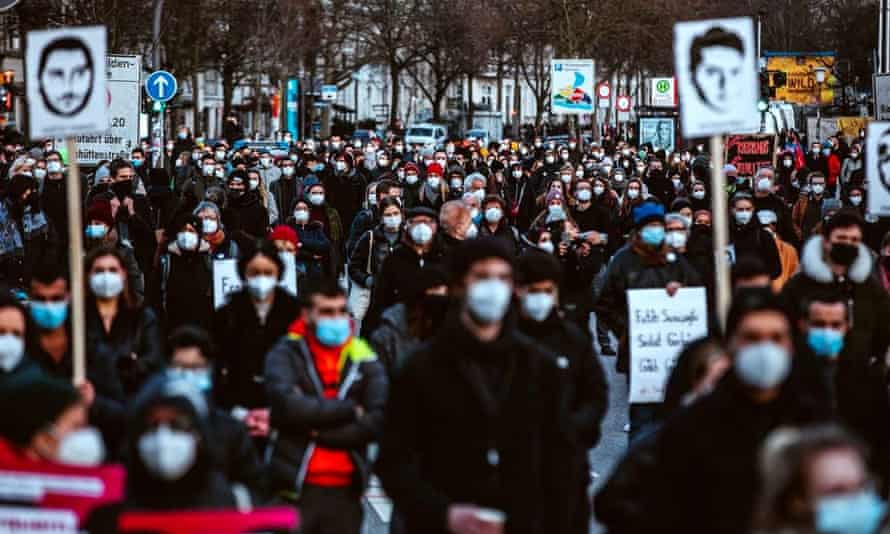Police recorded almost 24,000 far-right crimes last year – the highest level since records began

First published on Tue 4 May 2021 16.37 BST
Germany’s interior minister has said that a dramatic rise in rightwing extremist crime demonstrates a “brutalisation” of society and poses the biggest threat to the country’s stability.
Horst Seehofer said politically motivated crime in general was a growing problem, pledging more police surveillance of protest groups as a result.
Police recorded almost 24,000 far-right crimes last year, a rise of almost 6% on the previous year and the highest level since records began 20 years ago. Crimes ranged from displaying Nazi symbols and antisemitic remarks to physical attacks and murder. Activities targeted mainly immigrants, refugees and black Germans, but also included a rise in anti-Asian violence, linked to the pandemic.
Politically motivated crime in general rose by almost 9% to almost 45,000, with just under 11,000 incidents having a leftwing extremist background, including 1,526 cases of violence. Islamist crime was also notably higher than in previous years, Seehofer said.
Antisemitic attacks, which increased by almost 16% and had mainly been carried out online, were, Seehofer said, “not only alarming but owing to the context of our history, also deeply shameful”.
Moshe Kantor, president of the European Jewish Congress, said the German numbers highlight a broader issue. “This is a wake-up call, not just for Germany, but for the whole world,” he said. “These figures should ring alarm bells, because we are seeing similar trends across the western world.”
Seehofer said the data showed “what I’ve been saying since the start of my period in office: that rightwing extremism is the biggest threat for security in our country, as the majority of racist crimes are committed by people from within this group”.
Presenting the statistics in Berlin, Seehofer said rightwing violence had left a “trail of blood” throughout Germany, citing the far-right murder of the pro-refugee Christian Democrat politician Walter Lübcke in 2019 and the racially motivated 2020 attack in the city of Hanau last year, in which a far-right extremist gunman killed nine young people all of whom had an immigrant background.
There were 49 more incidents last year than the previous recorded high during the refugee crisis in 2016 during which a million refugees arrived in Germany.
Seehofer said even if they only represented about 1% of all crimes, the figures demonstrated a brutalisation of German society and should act as an early warning system to expose growing trends.
Hate crime in particular, had become a yardstick for the mood in the country during the pandemic, he said, after conspiracy theorists had found expression in demonstrations against coronavirus restrictions driven often by the “Querdenker” or “lateral thinker” movement that has links to QAnon, the US far-right conspiracy group. Seehofer said the demonstrations had “huge escalation potential”.
Almost 3,560 politically motivated crimes, including 500 violent acts, were connected directly to the pandemic, and were not classified as either far-right or far-left. Almost 10% of the 1,260 attacks carried out against journalists took place in conjunction with coronavirus restriction protests.
Authorities have raised concerns about the role the Alternative für Deutschland party allegedly played in stoking a climate of resentment toward immigrants and the government. The party, which came third in Germany’s 2017 election, has moved steadily to the right in recent years, drawing increasing scrutiny from the country’s domestic intelligence agency.
On Tuesday, Afd’s section in Berlin condemned a member who appeared to lament the absence of attacks on the chancellor Angela Merkel.
The news website Business Insider reported that AfD’s former chairman in Berlin, Günter Brinker, forwarded a message stating that “either that piece of dirt is so well protected that nobody can get at her, or don’t the Germans have any balls?”
Brinker said later that he had mistakenly forwarded the message and regretted doing so, and that he rejected “all forms of hatred and violence”.
On Tuesday a 53-year-old man was arrested in Berlin, believed to have been behind more than 100 anti-foreigner death threats sent by letter, fax and via social media, targeting prominent Germans over the past three years.
The man signed his threats with the codename NSU 2.0, a reference to the far-right terror cell National Socialist Underground, which between 2000 and 2007 murdered 10 people, all of whom except one, a female police officer, had an immigrant background. The man identified only as Alexander Horst M was arrested on Monday evening while at his computer. It is as yet unclear whether he operated alone.

-(2).png)










